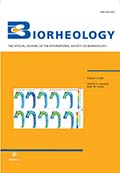Authors: Masuda, Hirotake | Kikuchi, Yoshitomo | Nemoto, Tetsu | Bukhari, Abda | Togawa, Tatsuo | Kamiya, Akira
Article Type:
Research Article
Abstract:
To study the morphological changes in the endothelial surface of the artery induced by wall shear stress load, an arterio-venous shunt was constructed between the common carotid artery and the external jugular vein in 21 dogs. The ultrastructural changes in the endothelial surface were observed by scanning electron microscopy after the measurement of the hemodynamic parameters. In acute experiments (3 days or 1 week postoperative), the clear ultrastructural changes, such as the disturbance of the smooth folds, the fine transverse wrinkles, the small spindle swellings, the splitting of the intercellular junction of the endothelial cells and occasionally the desquamation of
…the endothelial cells, were significantly observed as proportional to the elevated flow rate ratio (fs/fc, fs: flow rate of the shunted artery, fc: flow rate of the control artery). In subacute experiments (2 or 4 weeks postoperative), the small spindle swellings were observed in the shunted artery with high flow rate ratio. In chronic experiments (5 or 6 months postoperative), these changes were less proportional to the flow rate ratio. These morphological changes were significant in the disturbance of the endothelial barrier in acute experiments and they were significant in adaptive regulatory change in the chronic experiments. These support our previous observation (Am. J. Physiol. 239, H14-21, 1980). The possibility of the wall shear stress for atherogenesis was discussed.
Show more
Keywords: wall shear stress, carotid artery, arterio-venous shunt, scanning electron microscopy, endothelial cell, atherosclerosis
DOI: 10.3233/BIR-1982-191-222
Citation: Biorheology,
vol. 19, no. 1-2, pp. 197-208, 1982
Price: EUR 27.50





